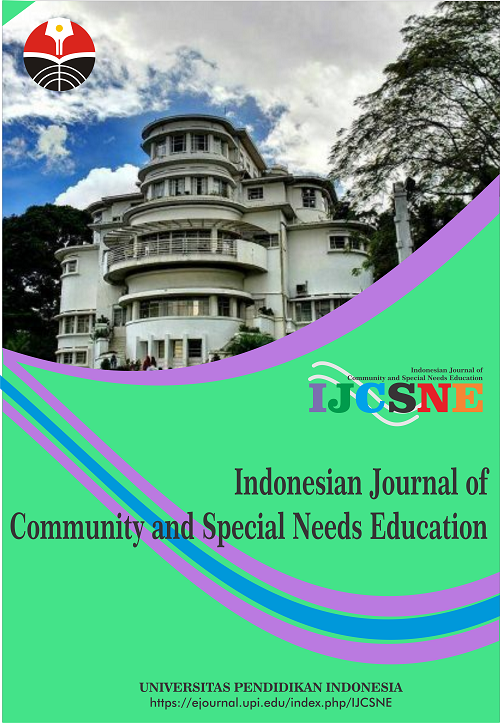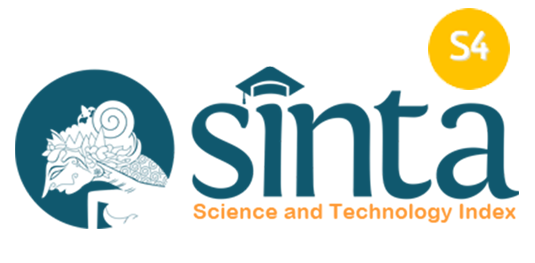Pedagogical Strategies for Enhancing Inclusive Education in Uzbekistan: Challenges, Interventions, and Social Impact
Abstract
Keywords
Full Text:
PDFReferences
Alavinia, P., and Farhady, S. (2012). Teaching vocabulary through differentiated instruction: Insights from multiple intelligences and learning styles. Modern Journal of Language Teaching Methods, 2(4), 73.
Atkinson, J. A., Vallely, A., Fitzgerald, L., Whittaker, M., and Tanner, M. (2011). The architecture and effect of participation: a systematic review of community participation for communicable disease control and elimination implications for malaria elimination. Malaria Journal, 10, 1-33.
Azupogo, U. W., Dassah, E., and Bisung, E. (2025). Navigating water and sanitation environments in schools: Exploring health risk perceptions of children with physical disabilities using drawing. Wellbeing, Space and Society, 8, 100255.
Bani Odeh, K., and Lach, L. M. (2024). Barriers to, and facilitators of, education for children with disabilities worldwide: a descriptive review. Frontiers in Public Health, 11, 1294849.
Baquedano-López, P., Alexander, R. A., and Hernandez, S. J. (2013). Equity issues in parental and community involvement in schools: What teacher educators need to know. Review of Research in Education, 37(1), 149-182.
Bi, M., Struyven, K., and Zhu, C. (2023). Variables that influence teachers’ practice of differentiated instruction in Chinese classrooms: A study from teachers’ perspectives. Frontiers in Psychology, 14, 1124259.
Buchner, T., Shevlin, M., Donovan, M. A., Gercke, M., Goll, H., Šiška, J., and Corby, D. (2021). Same progress for all? Inclusive education, the United Nations Convention on the rights of persons with disabilities and students with intellectual disability in European countries. Journal of Policy and Practice in Intellectual Disabilities, 18(1), 7-22.
Dixon, F. A., Yssel, N., McConnell, J. M., and Hardin, T. (2014). Differentiated instruction, professional development, and teacher efficacy. Journal for the Education of the Gifted, 37(2), 111-127.
Elton-Chalcraft, S., Cammack, P., and Harrison, L. (2016). Segregation, integration, inclusion and effective provision: a case study of perspectives from special educational needs children, parents and teachers in Bangalore, India. International Journal of Special Education, 31(1), 2-9.
Estrada, M., Eroy‐Reveles, A., and Matsui, J. (2018). The influence of affirming kindness and community on broadening participation in STEM career pathways. Social Issues and Policy Review, 12(1), 258-297.
Francisco, M. P. B., Hartman, M., and Wang, Y. (2020). Inclusion and special education. Education Sciences, 10(9), 238.
Githens, R. P. (2007). Older adults and e-learning: Opportunities and barriers. Quarterly Review of Distance Education, 8(4), 329.
Greenhalgh, T., Jackson, C., Shaw, S., and Janamian, T. (2016). Achieving research impact through co‐creation in community‐based health services: literature review and case study. The Milbank Quarterly, 94(2), 392-429.
Kurowski, M., Černý, M., and Trapl, F. (2022). A review study of research articles on the barriers to inclusive education in primary schools. Journal on Efficiency and Responsibility in Education and Science, 15(2), 116-130.
MacLeod, K., Causton, J. N., Radel, M., and Radel, P. (2017). Rethinking the individualized education plan process: Voices from the other side of the table. Disability & Society, 32(3), 381-400.
Mannan, H., MacLachlan, M., McVeigh, J., and EquitAble Consortium. (2012). Core concepts of human rights and inclusion of vulnerable groups in the United Nations Convention on the rights of persons with disabilities. Alter, 6(3), 159-177.
Maton, K. I. (2000). Making a difference: The social ecology of social transformation. American Journal of Community Psychology, 28(1), 25-57.
Nurmaganbetova, R., Kaldybayeva, A., Sartbekova, N., Umirbekova, A., and Akhmetshin, E. (2020). Formation of readiness of future teachers of the Republic of Kazakhstan for implementation of education in the inclusive environment. Journal of Intellectual Disability-Diagnosis and Treatment, 8(2), 205-210.
Owusu-Ansah, J. K., Baisie, A., and Oduro-Ofori, E. (2019). The mobility impaired and the built environment in Kumasi: Structural obstacles and individual experiences. GeoJournal, 84, 1003-1020.
Penuel, W. R., Riedy, R., Barber, M. S., Peurach, D. J., LeBouef, W. A., and Clark, T. (2020). Principles of collaborative education research with stakeholders: Toward requirements for a new research and development infrastructure. Review of Educational Research, 90(5), 627-674.
Pratiwi, H., Ismail, M., and Riwanda, A. (2024). Questioning inclusive city quality: Teachers' perspectives and experiences in sexuality education for children with special needs in Indonesia. International Journal of Educational Research, 127, 102419.
Stofer, K. A., Hanson, D., and Hecht, K. (2023). Scientists need professional development to practice meaningful public engagement. Journal of Responsible Innovation, 10(1), 2127672.
Suprayogi, M. N., Valcke, M., and Godwin, R. (2017). Teachers and their implementation of differentiated instruction in the classroom. Teaching and Teacher Education, 67, 291-301.
Tobin, R., and Tippett, C. D. (2014). Possibilities and potential barriers: Learning to plan for differentiated instruction in elementary science. International Journal of Science and Mathematics Education, 12, 423-443.
Waitoller, F. R., and Artiles, A. J. (2013). A decade of professional development research for inclusive education: A critical review and notes for a research program. Review of Educational Research, 83(3), 319-356.
DOI: https://doi.org/10.17509/ijcsne.v5i1.82691
Refbacks
- There are currently no refbacks.
Copyright (c) 2025 Universitas Pendidikan Indonesia

This work is licensed under a Creative Commons Attribution-ShareAlike 4.0 International License.















